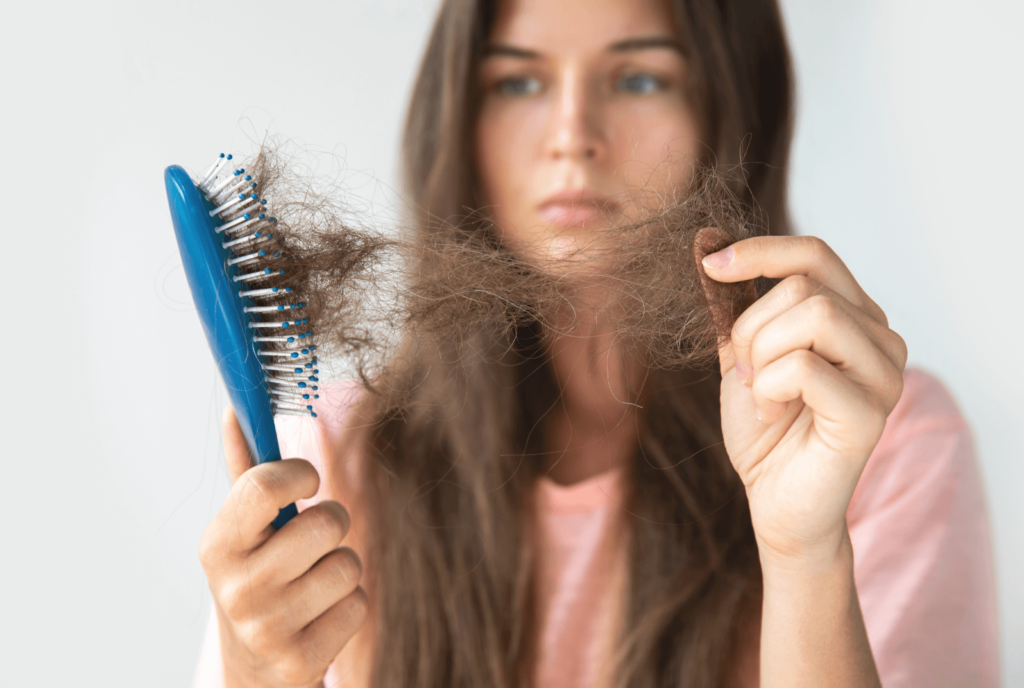
Introduction
Stress is an unavoidable part of life, but its impact on physical health often goes beyond what we can see. Skin and hair, as visible indicators of overall well-being, are particularly vulnerable to the effects of stress. The “brain-skin connection” highlights how stress hormones like cortisol influence skin and hair conditions, exacerbating existing issues or triggering new ones.
This article explores six common skin and hair conditions linked to stress, explaining their mechanisms, evidence from research, and practical management tips to help you regain control over your skin and hair health.
1. Acne and Breakouts
Mechanism: Stress triggers the release of cortisol, often referred to as the “stress hormone.” Elevated cortisol levels increase oil gland activity in the skin, leading to excess sebum production. This sebum clogs pores, creating an ideal environment for acne-causing bacteria to thrive, resulting in breakouts.
Evidence: Studies show a strong correlation between stress levels and acne severity. For example, research published in Acta Dermato-Venereologica found that adolescents with high-stress levels experienced more frequent and severe acne outbreaks compared to their peers.
Management Tips:
- Consistent skin care routines using gentle cleansers and non-comedogenic moisturisers can help manage breakouts.
- Stress management techniques such as mindfulness meditation or yoga can reduce cortisol levels.
- Seek professional dermatological treatments like salicylic acid peels or prescription retinoids for persistent acne.
2. Eczema (Atopic Dermatitis)
Mechanism: Stress weakens the skin barrier by disrupting its natural lipid composition, making it more susceptible to irritants and allergens. Additionally, stress triggers inflammatory cytokines that exacerbate eczema symptoms such as dry, itchy, red patches on the skin.
Evidence: Research highlights that stress is a common trigger for eczema flares. A study in The Journal of Allergy and Clinical Immunology found that individuals under chronic stress had longer-lasting eczema episodes due to impaired wound healing.
Management Tips:
- Regular use of emollients and moisturisers helps repair the skin barrier.
- Topical corticosteroids or calcineurin inhibitors can reduce inflammation during flares.
- Incorporate relaxation techniques like deep breathing exercises or therapy into daily routines to manage stress effectively.
3. Psoriasis
Mechanism: Stress activates the hypothalamic-pituitary-adrenal (HPA) axis, which increases systemic inflammation by releasing pro-inflammatory cytokines. This heightened inflammatory response worsens psoriasis plaques, leading to more severe symptoms such as scaling and itching.
Evidence: Clinical observations have consistently linked psychological stress to psoriasis flares. According to a study published in The British Journal of Dermatology, patients reported increased plaque severity during stressful periods compared to times of lower emotional strain.
Management Tips:
- Treatments like phototherapy or biologics can target inflammation effectively.
- Cognitive behavioural therapy (CBT) has shown promise in reducing stress-induced psoriasis flares by improving emotional resilience.
- Regular exercise and adequate sleep can help regulate inflammatory responses

4. Hair Loss (Telogen Effluvium and Alopecia Areata)
Mechanism: Chronic stress disrupts the normal hair growth cycle by pushing hair follicles into the resting phase (telogen), leading to diffuse shedding known as telogen effluvium. Stress can also trigger autoimmune responses, resulting in alopecia areata, where the immune system attacks hair follicles, causing patchy hair loss.
Evidence: Studies have shown that acute stress events, such as illness or emotional trauma, often precede episodes of telogen effluvium and alopecia areata. Research published in The Journal of Investigative Dermatology highlights the role of stress hormones like cortisol in disrupting follicular activity and triggering immune dysregulation.
Management Tips:
- Focus on scalp care by using gentle shampoos and conditioners to reduce irritation.
- Nutritional support, including biotin, iron, and omega-3 fatty acids, can promote healthy hair growth.
- Address underlying stress through lifestyle changes such as regular exercise, meditation, or therapy.
- Increasing evidence is suggesting that early aggressive intervention of Alopecia areata may be alter the long term outcome of alopecia with patients retaining or regaining more of their hair.
5. Premature Greying of Hair
Mechanism: Chronic stress depletes melanocyte stem cells in hair follicles, which are responsible for producing pigment. This depletion accelerates greying by reducing the availability of pigment-producing cells.
Evidence: Animal studies published in Nature Medicine have demonstrated a direct link between chronic stress and premature greying due to the loss of melanocyte stem cells. While human studies are still emerging, anecdotal evidence strongly supports this connection.
Management Tips:
- Stress reduction strategies like yoga, mindfulness meditation, or journaling can help slow the process.
- Maintain a balanced diet rich in antioxidants (e.g., vitamins C and E) to protect melanocytes from oxidative stress.
- Consult with a dermatologist for advice on topical treatments or supplements that may support pigment retention.
6. Hives and Itchy Skin (Pruritus)
Mechanism: Stress triggers the release of histamine—a chemical involved in allergic reactions—which leads to hives (urticaria) or generalised itching (pruritus). Neurogenic inflammation caused by stress can also exacerbate these skin conditions.
Evidence: Observational studies have shown that individuals with high perceived stress levels are more likely to experience hives and pruritus. Research published in PsychCentral explains how stress-induced histamine release causes inflammation and itchiness, particularly during acute stressful events. Chronic hives may also result from autoimmune dysregulation triggered by prolonged stress.
Management Tips:
- Over-the-counter antihistamines like loratadine or diphenhydramine can provide relief from itching and swelling.
- Address underlying emotional triggers through therapy or relaxation techniques such as breathing exercises.
- Avoid known irritants like tight clothing or high-histamine foods if prone to chronic hives.
Conclusion
Stress exerts a profound impact on skin and hair through hormonal, immune, and inflammatory pathways. From acne breakouts to premature greying and hives, managing stress is crucial for maintaining overall health and well-being. By addressing both physical symptoms and underlying emotional health, individuals can mitigate the effects of stress on their skin and hair.
Take Control of Your Skin Health Today
If you’re struggling with skin or hair conditions exacerbated by stress, The Skincare Network is here to help. Our expert dermatologists offer personalised consultations to address your concerns with tailored treatment plans that combine advanced dermatological care with stress management techniques.
Visit www.skincarenetwork.co.uk today to book your appointment and learn more about how we can help you achieve healthier skin and hair while managing the effects of stress. Prioritise self-care—your skin deserves it!
